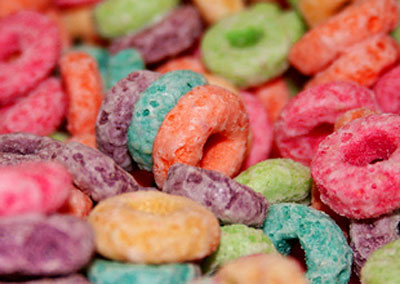|
by Ida Hartmann October 26, 2011 from AlterNet Website
A trip to the supermarket is an adventure into a tempting and treacherous jungle.
The insatiable hunger for a ready-made breakfast that nourishes our bodies and our social conscience has made our morning bowls of cereal a hiding place for corporate charlatans.
A new report,
Cereal Crimes, by the Cornucopia
Institute discloses the toxic truth about “natural” products and
unmasks corporate faces
like Kellogg’s hiding behind supposedly
“family-run” businesses such as Kashi.
Let’s have a look at some of these corporations’
sneaky strategies.
Many make claims about health, boasting,
Others play to environmental concerns declaring,
With the legion of labels, separating wheat from chaff seems impossible, but the report offers one rule of thumb:
Organics, certified and recognizable by the green USDA label, are required by federal law to be produced without toxic inputs and genetically engineered ingredients.
“Natural,” on the other hand, is defined by the producers themselves to mislead shoppers and protect shareholders.
Cornucopia’s report found that,
Too bad we’ve been falling for it.
The report cites a 2009 poll showing 33
percent of the public trusts the “natural” label while 45 percent
trust the organic label.
Tests run by the institute showed as high as 100 percent genetically engineered (GE) contaminated ingredients in popular products like,
Even the brands explicitly claiming to be “non-GMO” failed the test, some of them containing more that 50 percent GE corn.
Organic products, such as Nature’s Path certified organic corn flakes, were GMO and GE free when tested. Moreover, conventional ingredients, which “natural” products contain, have been found to hold traces of pesticides.
The USDA found detectable neurotoxins in popular breakfast ingredients like oats, wheat, soybeans, corn, almonds, raisins, blueberries, honey and cranberries. New studies are constantly finding new health risks associated with exposure to pesticides.
One such found that exposure during pregnancy increased the risk of a pervasive developmental disorder and delays of mental development at 2 to 3 years of age, while another found postnatal exposure to be associated with behavioral problems, poorer short-term memory and motor skills, and longer reaction times among children.
Adding to the picture, a recent study by University of Montreal and Harvard University found association between organophosphate in children and ADHD. It is time for us to reconsider what we associate with the term "natural."
In his book, In Defense of Food, Michael Pollan sends out a warning against health claims on food:
The same applies to “natural.”
Labeling broccoli "natural" would offend
common sense. This is the irony of marketing: On a spectrum between
whole foods and processed products, the loudest “natural” claims
sound from the latter end.
The Kashi Web site reads:
Conveniently absent from packages and Web site is the fact that Kellogg, the largest cereal manufacturer in the country, acquired Kashi back in 2000.
Kellogg also owns Bear Naked. General
Mills, the second largest breakfast company in the country owns
Cascadian Farm, and Back to Nature is run by Kraft Foods, a company
with almost $50 million revenue in 2010.
Many shoppers and retailers did not
notice that the USDA label quietly disappeared from the bottom
right-hand corner.
Annie’s Homegrown, for example, was
featured in a 12-page advertisement section in the Washington Post,
paid for by the Organic Trade Organization and aimed at educating
consumers on the benefits of organics. Nowhere did it mention that
only one of five cereal products made by Annie’s Homegrown is
organic. That takes an investigation of the fine print on the box
many of us don’t perform as we race through the aisle in the short
minutes we often have to shop.
The report, however, shows just the opposite, and suggests that,
So next time you find yourself with a box of organic cereal in your right hand, and a box of natural cereal in your left, remember to read the fine print.
Don’t be fooled by labels that are meant
to sell products, not look after your health or the environment.
Natural vs. Organic Cereal
from
Cornucopia Website
Federal law requires that organic food
products be produced promoting ecological sustainability, without
the toxic inputs and genetically engineered ingredients common in
the conventional food system.
This report explores the vast differences between
organic cereal and
granola products and so-called natural products, which contain
ingredients grown on conventional farms where the use of toxic
pesticides and genetically engineered organisms is widespread.
|


